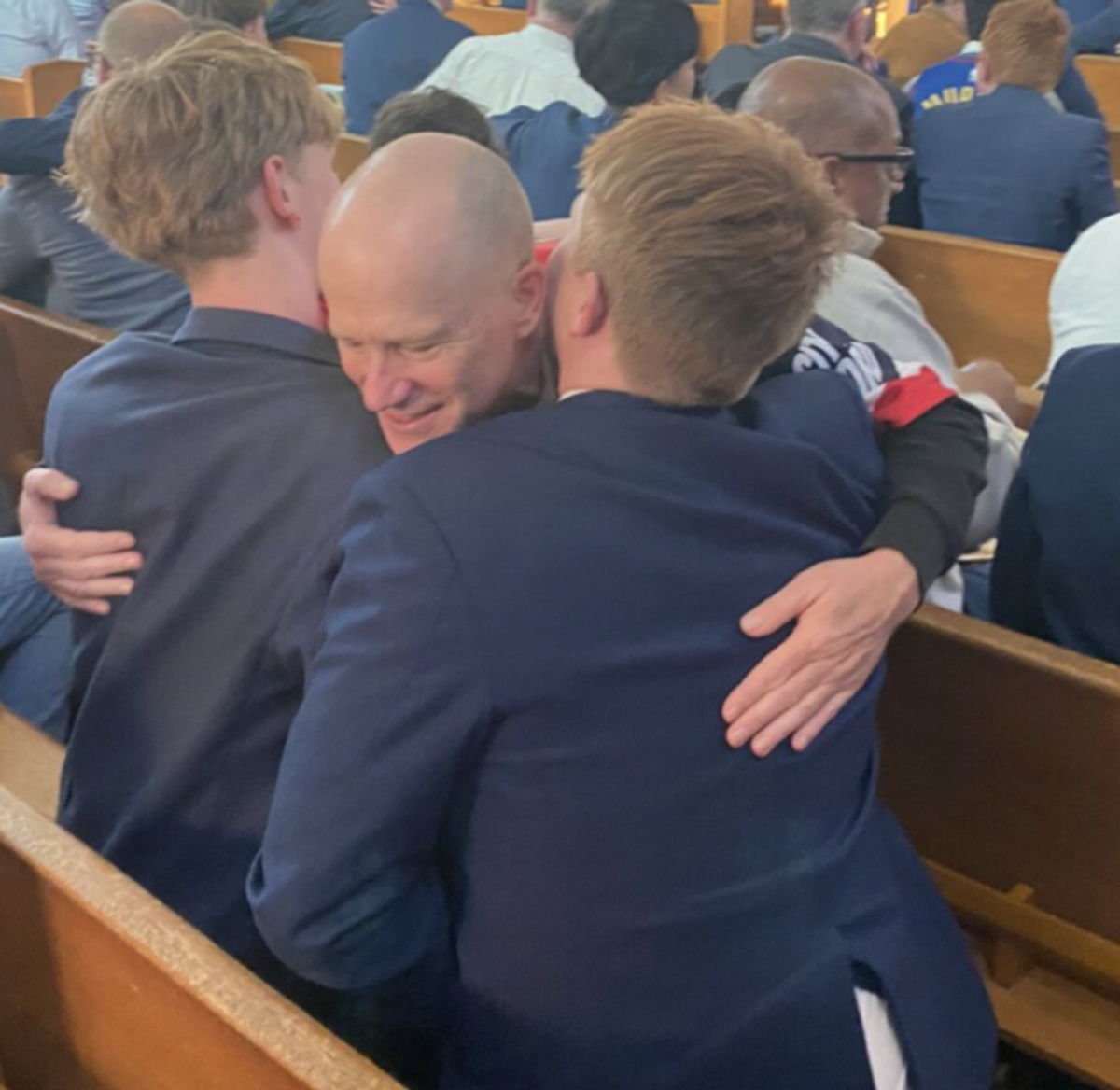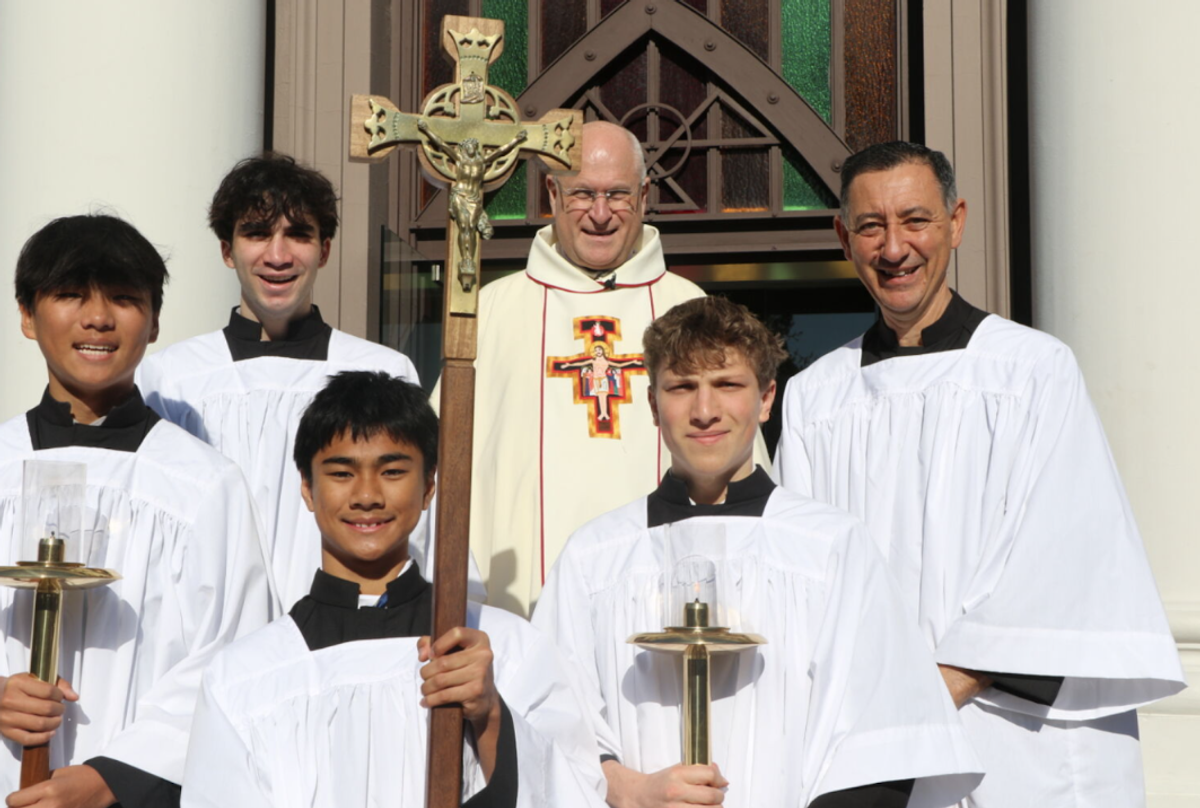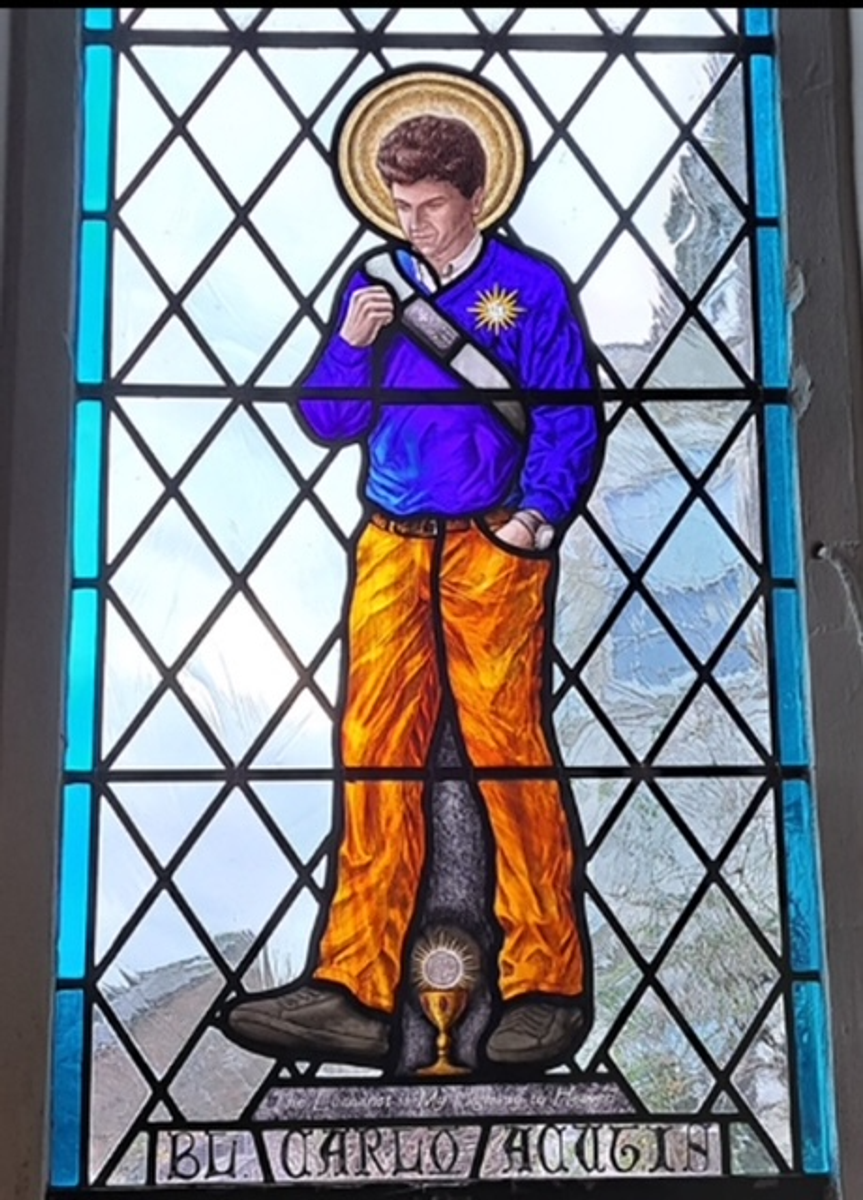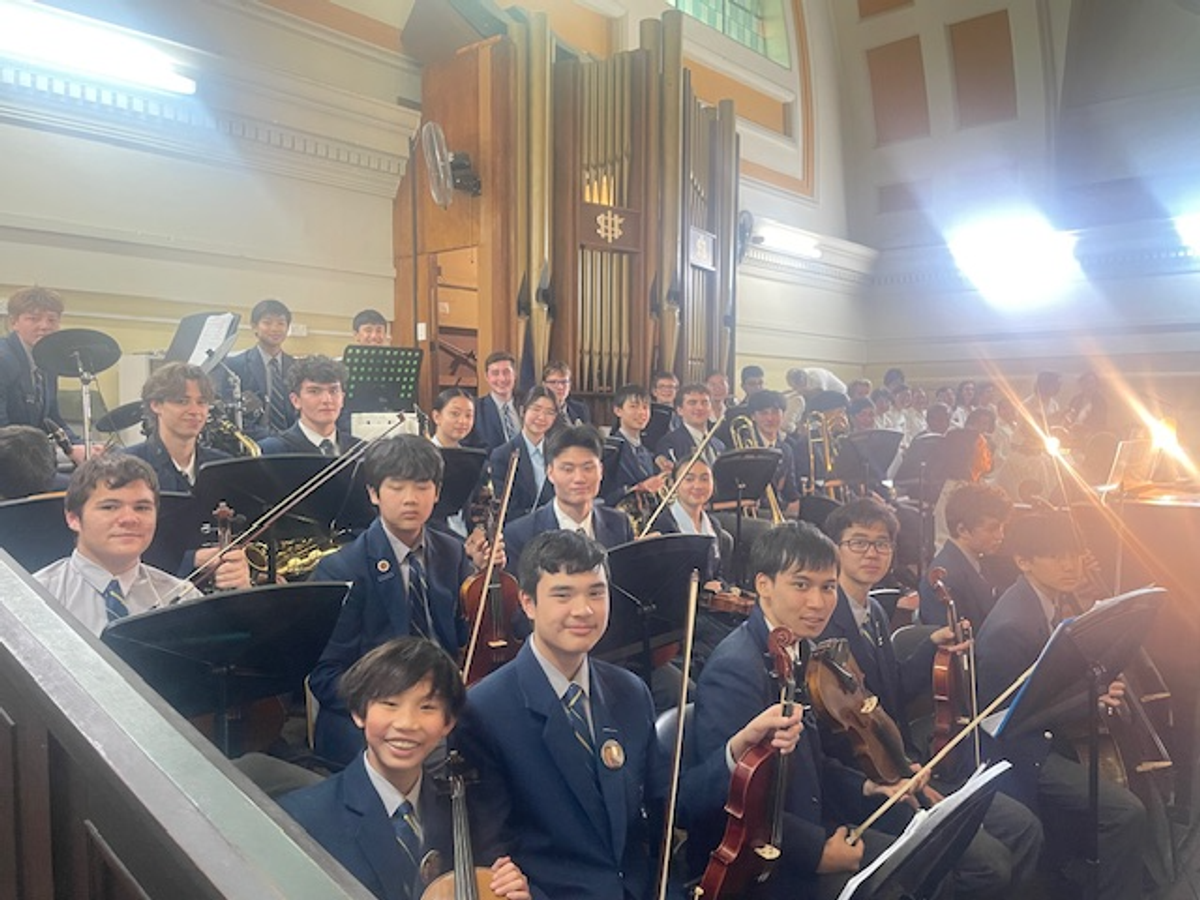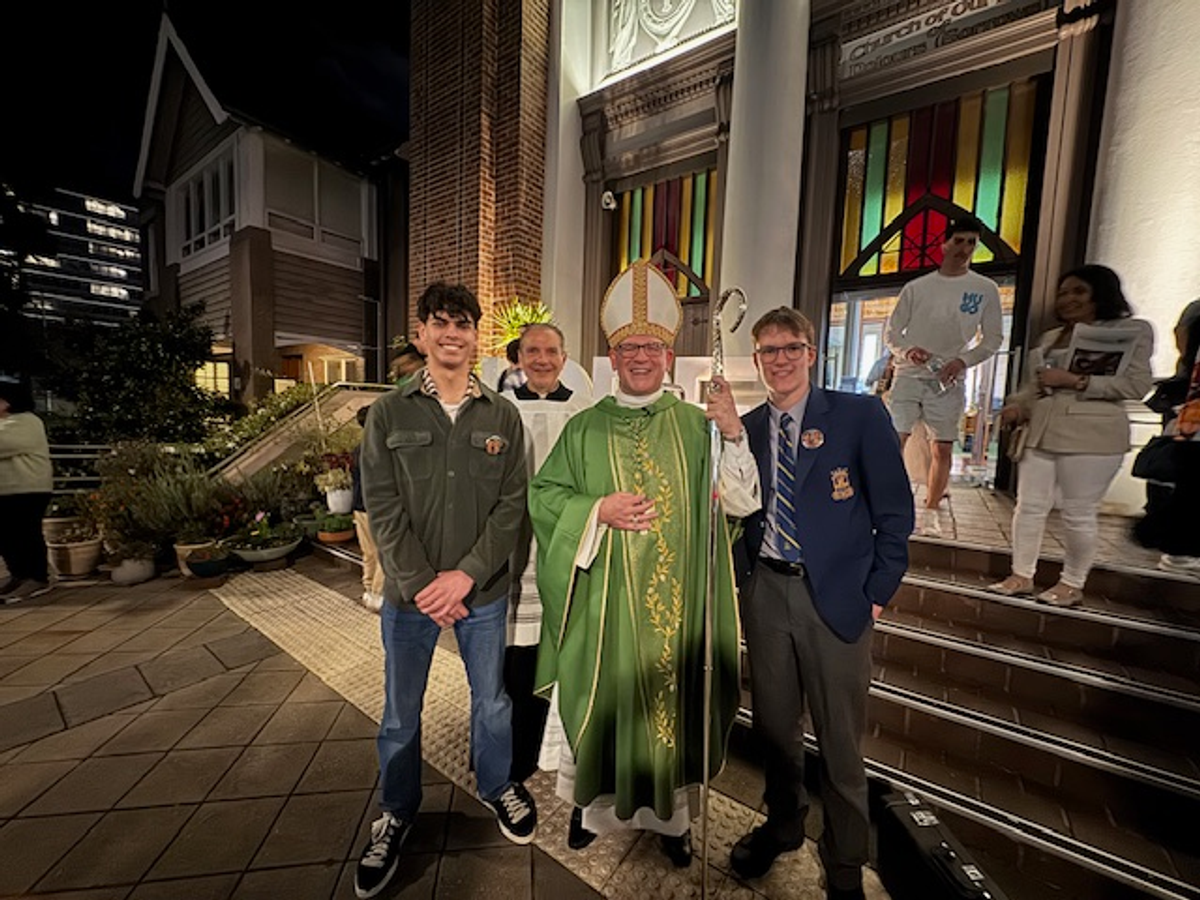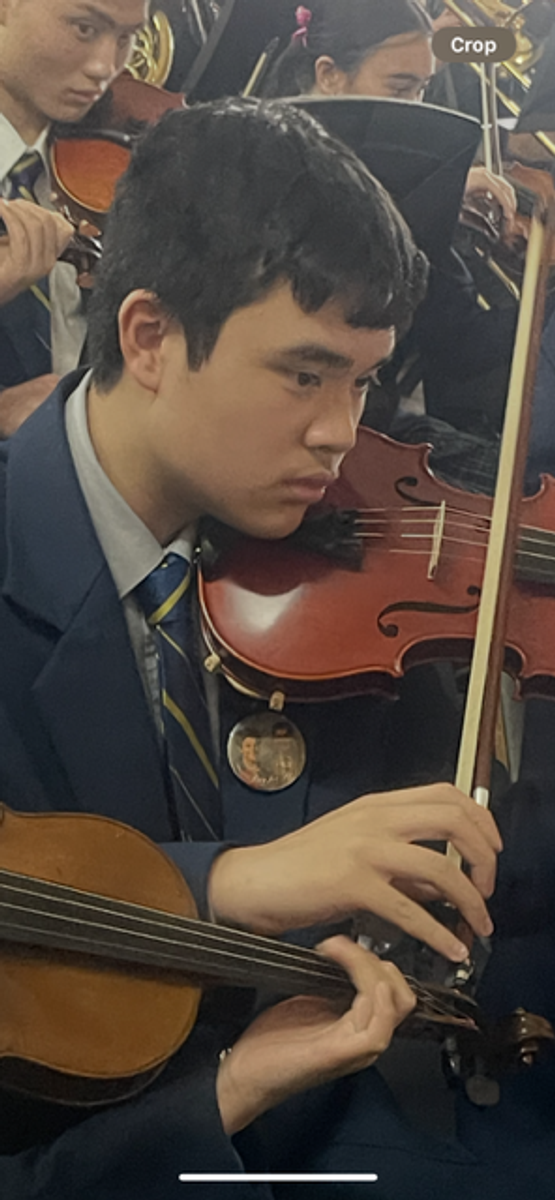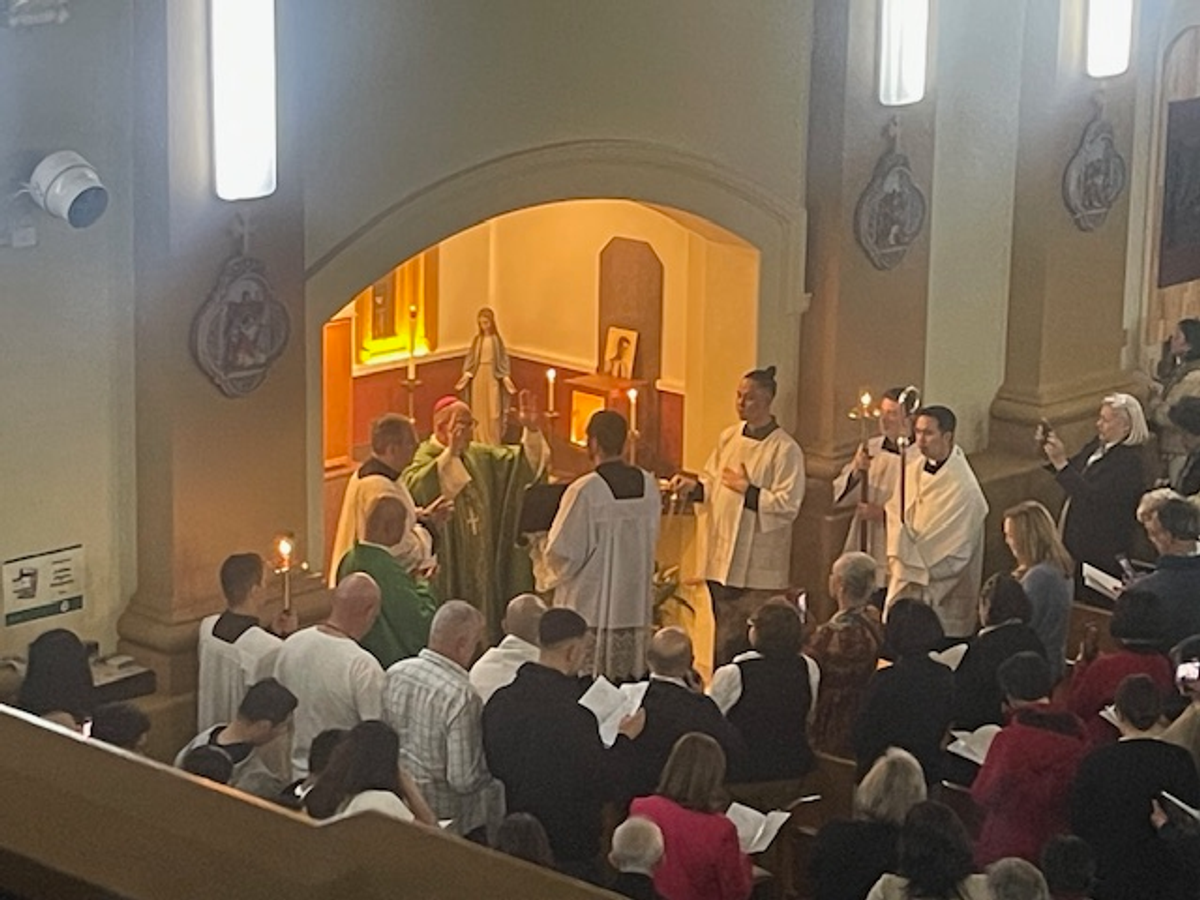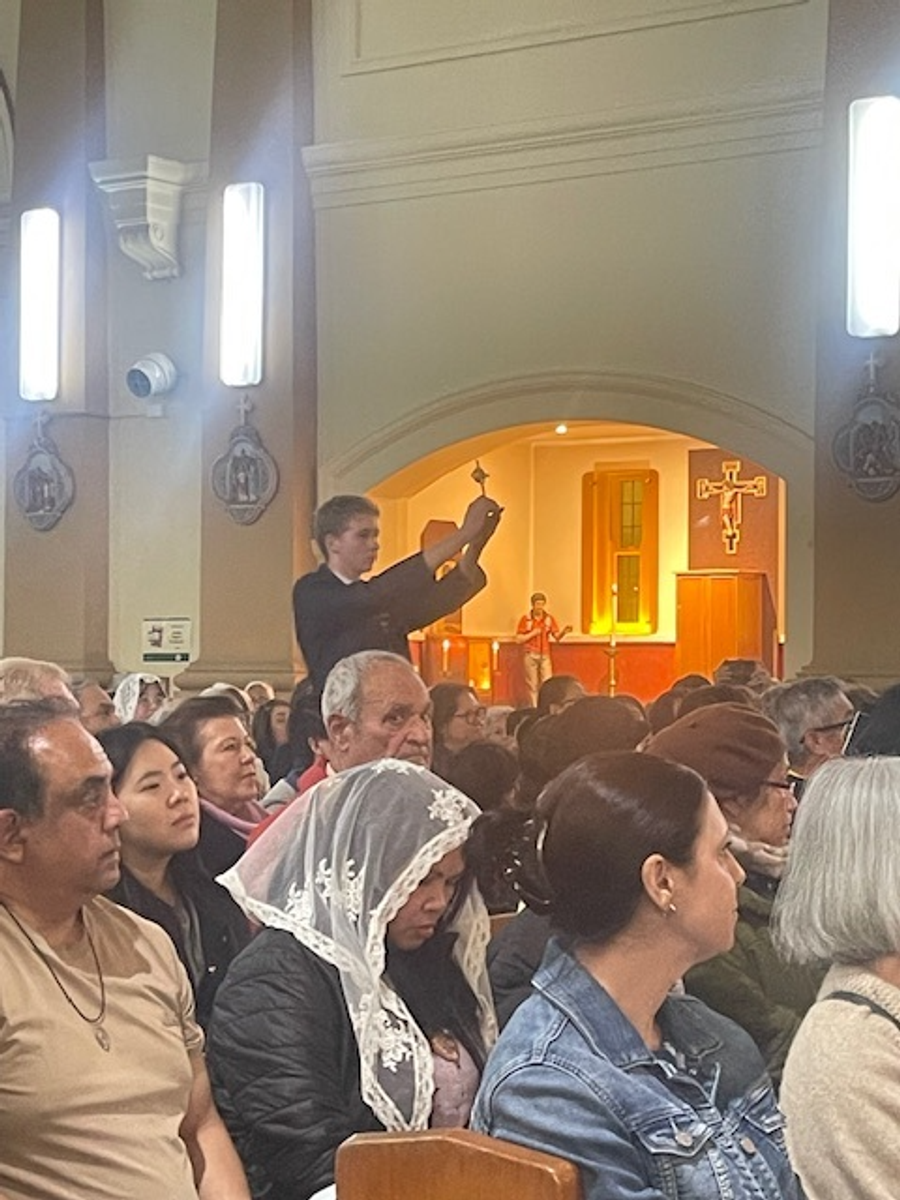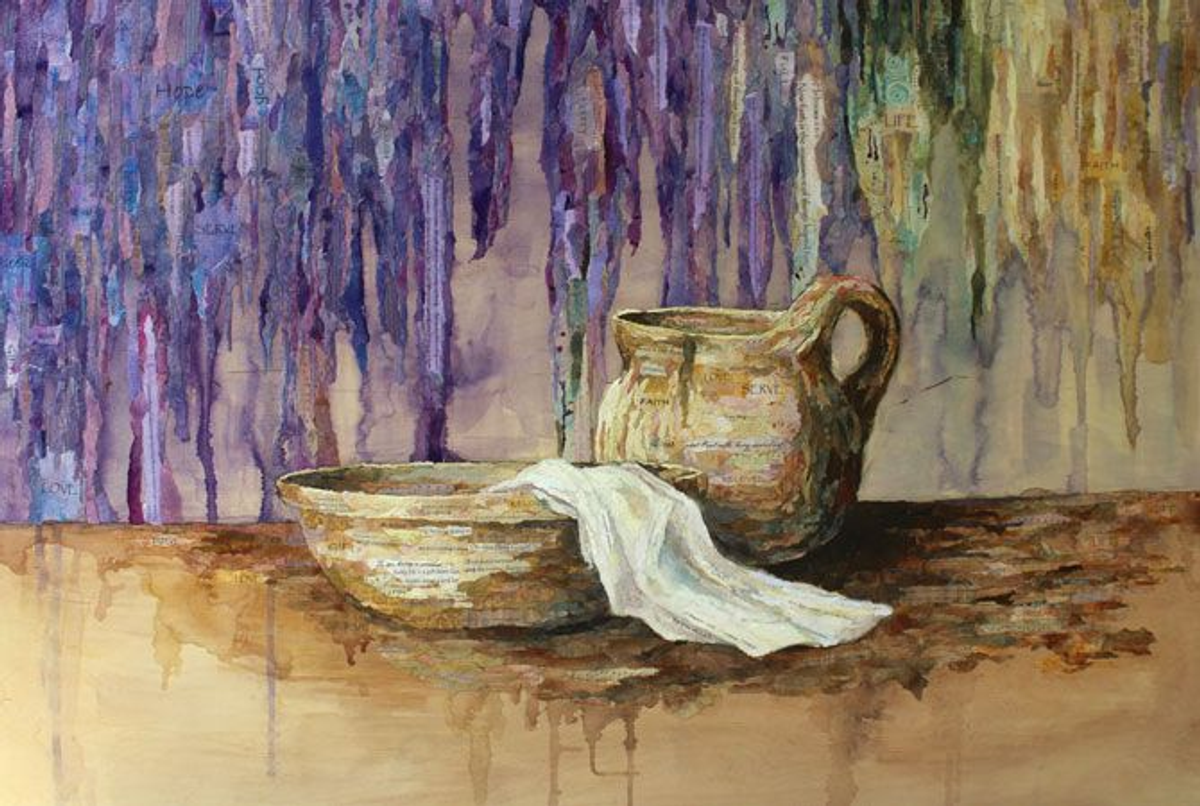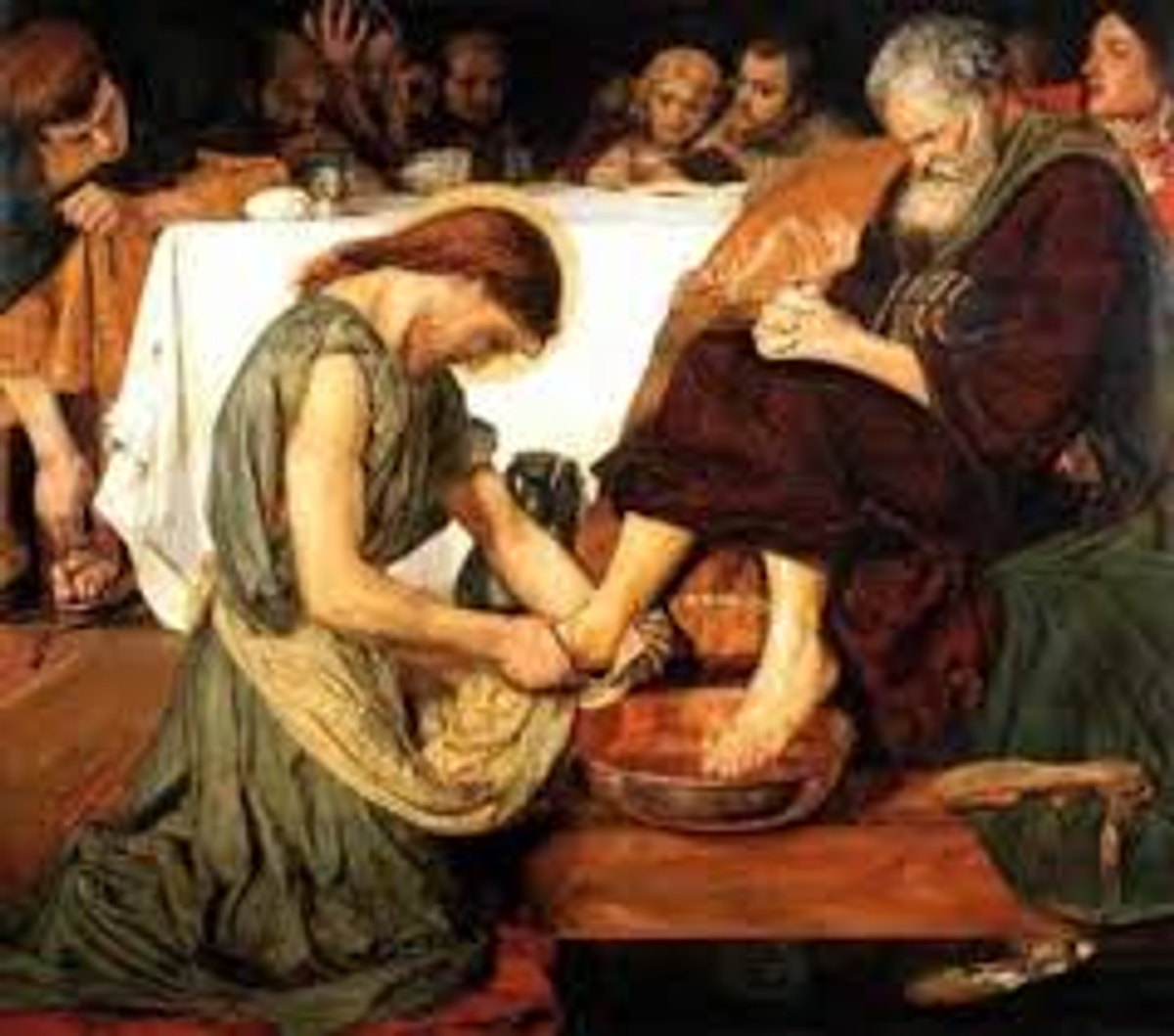Mission and Identity

- Father’s Day Mass and Breakfast
- Canonisation of St Carlo Acutis and St Piergiorgio Frassati
- A reflection on leadership through disruption
- A Call to Leaders
Father’s Day Mass and Breakfast
'Blessed are you when you hand on the gift of faith to your sons and daughters, guiding them in prayer and trust, and modelling the quiet strength of St Joseph - protector, provider, and servant of God’s will.' - In the spirit of St Joseph we celebrated our Father’s Day Mass and breakfast last Friday along with 650 fathers and their sons.
The Mass provided an opportunity to reflect on fatherhood through the lens of presence, gentleness, resilience and sacrificial love.
Fatherhood is both a gift and a calling, one that reshapes the heart and stretches the soul. To be a father is more than simply providing - it is about presence, about showing up in both the big and small moments. It means carrying responsibility, not as a burden, but as an act of love.
Fathers are often looked to for strength, but the truest strength lies not in control or authority, but in patience, gentleness, and the ability to listen. A father teaches not just with words, but with example: how he treats others, how he responds to hardship, how he shows love. In this way, fatherhood becomes a kind of mirror - children learn who they are and who they might become by what they see reflected in their father’s life.
At times, fatherhood reveals our own limitations. No father is perfect, and that truth can weigh heavily. Yet it is in the imperfections - in the mistakes, the apologies, the trying again - that children often learn the deepest lessons of grace and resilience.
Ultimately, fatherhood is about legacy. Not the legacy of possessions or achievements, but of love planted deeply in the hearts of one’s children. To be a father is to walk a lifelong path of self-giving, where joy is found not in what is gained, but in what is given away.
We pray that our community enjoyed a Happy Father’s Day and that it was an opportunity for quality time and happy memories.
Our deep gratitude to Fr David Ranson for our celebration of the Eucharist, and to Mr Di Sano, Mr Balboa and Mr Callow whose ministry as the Mission Team nourishes our community.
Please enjoy a recap video of our celebrations last Friday: Fathers Day Mass 2025.mov
Canonisation of St Carlo Acutis and St Piergiorgio Frassati
‘Bringing Jesus to others, no matter the cost. That is what holiness looks like in action’ - Bishop Anthony Randazzo shared these inspiring words in reference to St Carlo and St Piergiorgio during the Canonisation Mass that took place at Our Lady of Dolours Chatswood.
A relic of St Piergiorgio was installed during the Mass which now completes the shrine dedicated to both these amazing saints.
As the Canonisation Youth Orchestra from St Pius X and Mercy College played beautifully alongside the parish choir, the congregation had swelled way beyond the physical limits of the church into the street.
With hearts full of joy and love, the Bishop announced to much celebration that he would formally commence Our Lady of Dolours being recognised as a Minor Basilica!
Ad maiorem Dei gloriam!
To hear a view excerpt of our talented musicians, please view here: IMG_3832.MOV
A reflection on leadership through disruption
As the College enjoys the beginning of the next adventure of leadership through our newly elected leaders for 2026, the following reflection by Br Frederick James on leadership is a profound window into leadership ‘that kneels’. This is a powerful reminder not just on Christian Leadership but of a blueprint for Christian living:
'Leadership in our times often carries a subtle, unspoken script to be strong, be decisive, be unflinching. In the corporate world, in education, even in ministry, there can be a suspicion that kindness signals weakness, or that mercy undermines authority. The culture we live in tends to reward 'toughness', while 'tenderness' is sometimes seen as naïve.
And yet, Jesus kneels.
With the bowl and towel, Jesus disrupts every toxic script about power. He shows us that mercy is not weakness but strength, not an optional soft skill but a way of being that transforms cultures.
Kindness as Disruption:
Toxic cultures - whether in schools, workplaces, or faith communities - are fuelled by fear, control, and competition. In such environments, people protect themselves, keep score, and measure their worth against others. Leaders who enter this atmosphere with mercy disrupt the flow. Often, that disruption is so strong that it stirs up resistance and retaliation. Think of Peter as Jesus knelt at his feet with the bowl of water ready, for instance.
Kindness unsettles the unspoken rule that says: 'Only the strong survive.' Mercy interrupts the cycle of criticism and defensiveness. Compassion breaks the walls of suspicion and invites a different conversation. Empathy disarms any need to go into 'survival mode,' both in others an in ourselves.
This disruption is not about being 'nice' in a superficial sense. It is the deep, spiritual kindness that sees people not for their productivity, but for their dignity. It is mercy that holds the broken pieces of someone’s story without shame. It is a love that believes a person can change because God never stops working in them.
A Scriptural Vision: Mercy as Power
Consider the words of the prophet Micah:
'He has told you, O mortal, what is good; and what does the Lord require of you but to do justice, and to love mercy, and to walk humbly with your God?' (Micah 6:8)
This single verse offers a blueprint for leadership rooted in God’s heart. And its ordering is not accidental.
Justice comes first: A leader cannot ignore wrongs, overlook inequities, or allow systems of harm to persist. Justice is the work of naming and addressing what is broken. Without justice, kindness collapses into sentimentality.
Mercy follows: Once justice is pursued, mercy then provides the framework for how it is enacted. Justice without kindness becomes harsh and punitive, but mercy/kindness infused into justice ensures that restoration, not retribution, is the goal.
Humility grounds it all: Leaders must resist the temptation to believe they are the saviours. To 'walk humbly with God,' is to recognise that leadership is participation in God’s ongoing work, not our personal project. Humility ensures that justice and kindness remain tethered to God’s wisdom rather than our ego.
Put together, this triad forms what we might call disruptive fidelity.
Fidelity means faithfulness: steadfast loyalty to God’s vision of justice, mercy, and humility. But in a toxic culture, such fidelity is not neutral. It disrupts. It challenges the dominant scripts of domination, control, and fear.
To pursue justice in environments that prefer silence is disruptive.
To show mercy in a culture that rewards cruelty is disruptive.
To practice humility in a world that exalts pride and performance is disruptive.
Disruptive fidelity is what it looks like to remain faithful to God’s call in ways that unsettle toxic systems. It is not rebellion for rebellion’s sake, but faithfulness to a higher authority – to the God whose justice restores, whose mercy heals, and whose humility descends to wash feet.
This is the fidelity Jesus embodied when He welcomed outcasts, forgave and ate with 'sinners', and washed the feet of His disciples. Each act was a disruption. Each act was fidelity.
Take the words of Jesus in Luke’s Gospel:
'Be merciful, just as your Father is merciful.' (Luke 6:36)
Mercy is not optional. It is the very character of God. To lead with mercy is to reflect the divine heart, to incarnate in daily practice what Jesus embodied with His disciples. The foot washing in John 13 is not simply an act of service, but a cultural revolution: the Master takes the lowest position. Leadership is redefined at its root.
Mercy in Practice: Leadership from the Sacred Centre
When leaders abide in Christ, anchored in the Sacred Centre rather than the shifting expectations of culture, they can extend mercy without fear of losing authority. Authority, in fact, is redefined.
In leadership: A leader who practices mercy creates a culture where mistakes become learning opportunities, not weapons. Performance is still important, but people are not reduced to metrics.
In the classroom: A teacher who embodies kindness creates classrooms where students risk failing without fear, because they know mercy is present. Growth, not perfection, becomes the goal.
In ministry: A minister who leads with mercy challenges the toxic culture of judgment that sometimes creeps into faith communities. Mercy restores trust and opens space for grace to be experienced as healing, not as shame.
When leadership flows from the Sacred Centre, when it is rooted in abiding with Christ, mercy ceases to be an add-on. It becomes the very expression of authority itself.
The Courage of Mercy
Mercy requires courage because it goes against the grain. It challenges leaders to resist cynicism, to keep their hearts soft in hard environments, and to believe in people even when the evidence seems thin.
The Cross itself is the ultimate disruption of mercy. Christ absorbs violence, hatred, and sin, and responds with forgiveness. In a culture of revenge, mercy is revolutionary. In a culture of efficiency, kindness is prophetic.
This is not the naïve kindness of avoidance or denial. It is the fierce kindness that tells the truth without condemnation, that holds boundaries without humiliation, that refuses to dehumanise even in the face of betrayal.
A Call to Leaders
What kind of culture are you shaping? Do people around you feel they must protect themselves, or do they feel they are safe to grow? Does your leadership reflect toughness at the expense of trust, or kindness that creates belonging?
The disruption of kindness is not sentimental, it is strategic. Mercy dismantles toxicity at its roots, not with force, but with grace. This is leadership with the bowl and towel, leadership from the Sacred Centre, leadership in the way of Jesus.
Because in the end, kindness is not weakness. It is power - power that heals, builds, and transforms.
Lord Jesus, You knelt with the bowl and towel and showed us that true power is found in mercy. Give me courage to lead with kindness, even when the culture around me rewards harshness. Give me strength to show mercy, even when cynicism whispers that it will not last. Anchor me in You, the Sacred Centre, so that my leadership flows not from fear, but from love. May my presence create safety, my words bring dignity, and my actions build trust. Make me a leader who disrupts toxicity, not by force, but by grace. Amen.
Mr Daniel Petrie - Assistant Principal, Mission and Identity

